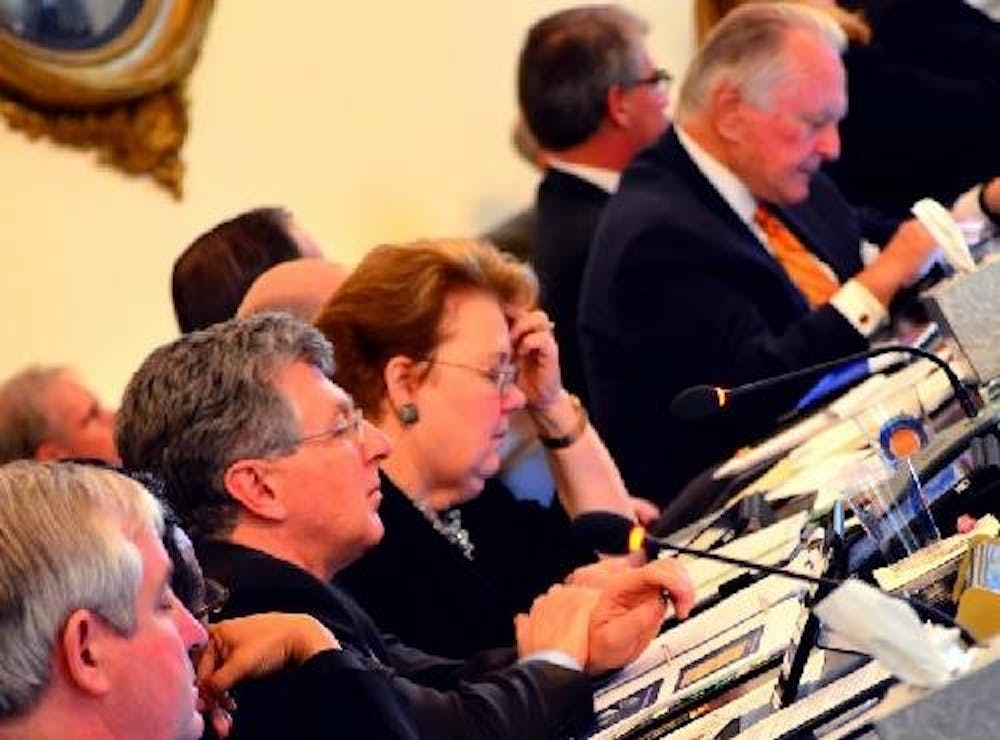The Association of American University Professors released a report Thursday criticizing the University Board of Visitors for its role in last summer’s forced resignation of University President Teresa Sullivan.
The decision to oust Sullivan, according to the report, “was a failure by those charged with institutional oversight to understand the institution over which they presided … It was a failure of judgment and, alas, of common sense.”
The report detailed the results of AAUP’s months-long investigation of the University, which included interviews with Sullivan, Provost John Simon , former University President John Casteen , Faculty Senate Chair George Cohen and a score of faculty members and other administrators.
After “vainly striving for some explanation for the Board’s action and the process it had followed,” the report says, the Board’s ouster of Sullivan, “appears to be nothing more than a crude exercise of naked power.”
The report focused on three main issues for University governance and Board processes: the possible role of outside influences, the patronage-dependent system of Board appointments and the continued lack of faculty input in University decision-making.
Opinions on the Board’s actions last summer are mixed. The American Council of Trustees and Alumni, an organization focused on promoting trustee involvement, instead voiced support for the Board.
After the Southern Association of Colleges and Schools (SACS) placed the University on warning Dec. 11 for violating two of the Association’s core requirements, ACTA filed a complaint with the Department of Education saying SACS had violated federal laws in its action against the University. ACTA appealed the decision to Secretary of Education Arne Duncan after an interim assistant secretary dismissed the Council’s complaint in early February.
Last week’s AAUP report addressed ACTA’s continued involvement in University issues.
“Given ACTA’s encouragement of the action the board took, we cannot discount the possibility of ACTA’s indirect influence on the board’s assertion of its unfettered authority,” the report says. A Jan. 2 Cavalier Daily Freedom of Information Act request found ACTA’s president Anne Neal had been in correspondence with Dragas and the rest of the Board, expressing Neal’s support of their decision last summer.
On the issue of appointments to the Board, the AAUP report called on Virginia politicians to “abjure patronage in favor of advancing the public good,” bolster the ad hoc procedure for vetting Board nominees and develop stronger measures to educate the Board about university affairs.
Two bills introduced by Del. Stephen Landes (R-Weyer’s Cave) attempt to reform Board processes described in the AAUP report by requiring faculty representation on university boards and mandating Board training sessions.
The AAUP report also decried the lack of faculty involvement in evaluating and removing the president as well as the Board’s failure to adequately address faculty compensation and workload.
“Indeed, had the board consulted the faculty in this instance, it is at least arguable that it would not have acted as it did,” the report says . “[T]he events that transpired … stand as mute testimony to the manifest wisdom of faculty consultation.”
Dragas has said the Board respects faculty and considers mitigating declining faculty compensation a top goal. Sullivan introduced a plan in November to raise $65 million for faculty salaries.
University media attention recently intensified following the Washington Post’s release of leaked emails showing lingering tension between Sullivan and Dragas.
The debate surrounding higher education has recently centered on the issue of whether universities should address concerns by using a business-first approach or by relying on the benefits of traditional academia.
The AAUP report criticizes its president Dragas’ “mindset of entrepreneurial control,” a mindset that “ill fits the role of trusteeship in the modern university.”







